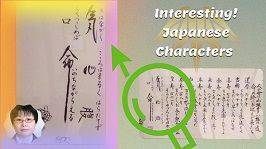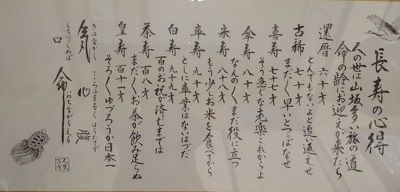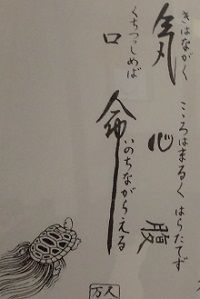
Popular Japanese idioms
Learning Japanese vocabulary and grammar is a great way to start studying Japanese. But sometimes it is useful to know some Japanese idioms as well.
Using the right idioms in your conversation will definitely impress your Japanese friends and co-workers and make your Japanese sound more natural too.
In this blog for Japanese learners., Miyako Fujinawa, a Japanese teacher at JOI, introduces a different look at the Japanese language where writers use the Kanji characters themselves as an idiom to point to a hidden meaning. Read the blog with Furigana for help with reading the Kanji and listen to the YouTube video too to practice your Japanese listening.
文字のおもしろさ
Interesting Japanese Characters

By FUJINAWA Miyako
下の写真は、私の家にある誰が書いたのかわからない書です。「長生きの心得」が書いてあります。

おもしろいし、よく考えたなと思うのが拡大写真の部分です。 漢字をよく見てください。

「気」という文字の形をわざと縦に長くして、「心」という字は丸く書いてあります。「腹」という字は横向きになっていますね。「口」は他の文字と比べると小さく書いてあります。そして、「命」という字は長く書かれています。
「気は長く、心はまるく、腹立てず、口つつしめば、命ながらえる」と読むのだそうです。 慣用句をうまく使って、文字をデザインしています。
「気は長く」は慣用句で、気持ちがゆったりしているという意味の言葉です。
「心は丸く」は「やさしい」とか「寛大」などの意味がある慣用句です。
「腹立てず」は「腹を立てない」と同じでこれも慣用句です。「怒らない」という意味です。
「口をつつしむ」は余計なことを言わないという意味の慣用句です。
「命ながらえる」は「長生きします」という意味です。
つまり、「ゆったりした気持ちで、誰にでもやさしく、怒らないで、余計なことを言わないようにしていれば長生きします」というのです。確かに、怒ると血圧が上がるといいますね。長生きのために大切なことかもしれません。
慣用句をうまく使って、文字で表現している、こういう遊びができるのも日本語のおもしろさだなと思います。
To listen to this blog, please watch our Youtube video.
文字(もじ)のおもしろさ
下(した)の写真(しゃしん)は、私(わたし)の家(いえ)にある誰(だれ)が書(か)いたのかわからない書(しょ)です。「長生きの(ながいき)の心得(こころえ)」が書いてあります。 おもしろいし、よく考えたなと思うのが拡大(かくだい)写真の部分(ぶぶん)です。 漢字をよく見てください。
「気(き)」という文字の形をわざと縦(たて)に長(なが)くして、「心(こころ)」という字は丸(まる)く書いてあります。「腹(はら)」という字は横向き(よこむき)になっていますね。「口(くち)」は他(た)の文字と比(くら)べると小さく書いてあります。そして、「命(いのち)」という字は長(なが)く書かれています。
「気は長く、心はまるく、腹立(はらた)てず、口つつしめば、命ながらえる」と読(よ)むのだそうです。 慣用句(かんようく)をうまく使って、文字をデザインしています。
「気(き)は長(なが)く」は慣用句(かんようく)で、気持ちがゆったりしているという意味(いみ)の言葉(ことば)です。
「心(こころ)はまるく」は「やさしい」とか「寛大(かんだい)」などの意味がある慣用句です。
「腹立(はらた)てず」は「腹を立てない」と同じでこれも慣用句です。「怒(おこ)らない」という意味です 。
「口(くち)をつつしむ」は余計(よけい)なことを言わないという意味の慣用句です。
「命(いのち)ながらえる」は「長生きします」という意味です。
つまり、「ゆったりした気持ちで、誰にでもやさしく、怒らないで、余計なことを言わないようにしていれば長生きします」というのです。確(たし)かに、怒ると血圧(けつあつ)が上(あ)がるといいますね。長生きのために大切なことかもしれません。
慣用句をうまく使って、文字で表現(ひょうげん)している、こういう遊(あそ)びができるのも日本語のおもしろさだなと思います。
Interesting Japanese Characters
The picture below shows a scroll I have in my house, although I don't know who wrote it. It is called "How to live a long life".
What is interesting and well thought out about it is the part that is shown in the enlarged picture. Look carefully at the Chinese characters.
The shape of the character for "spirit /ki" is deliberately lengthened, and the character for "heart/kokoro" is written round. The character for "belly/hara" is turned sideways. The character for "mouth/kuchi" is smaller than the other characters. And the character for "life/inochi" is longer.
It is said to read: "Be patient (ki ha nagaku), keep a good heart (koko ha maruku), don't get angry (hara ha tatezu), keep your mouth shut (kuchi tsutsumeba) and you will live (inochi nagaraeru). This is a good example of the use of idioms in the design of the letters.
「気は長くki ha nagaku」is an idiom meaning a relaxed state of mind.
「心は丸く koko ha maruku」 is an idiom meaning "be kind" or "be generous".
「腹立てず hara ha tatezu」or 「腹を立てない」is also an idiom meaning 'do not get angry'.
「口をつつしむkuchi wo tsutsumeba」is also an idiom that means not to say anything unnecessary.
「命ながらえる inochi nagaraeru」 means "to live a long time.
In other words, if you are relaxed, kind to everyone, don't get angry, and don't say unnecessary things, you will live longer. Indeed, it is said that anger raises blood pressure. This may be important for a long life.
I think the interesting thing about the Japanese language is that you can play with idioms like this, using them well and expressing them with characters.
文字(もじ):a letter
長生きの(ながいき)心得(こころえ):Knowledge of longevity
拡大(かくだい):expansion, enlargement
わざと:on purpose
他(た)の文字(もじ):other letters
比(くら)べる:compare
慣用句(かんようく):idioms
気(き)は長(なが)く:patient, having a long fuse
(気持ちが)ゆったりしている:big‐hearted
心(こころ)はまるく:generous, broad-minded
寛大(かんだい):generous
腹(はら)を立(た)てない:keep your temper
怒(おこ)らない:do not be angry
口をつつしむ:be careful of one's language
余計(よけい)なこと:unnecessary thing
命(いのち)ながらえる:survive
確(たし)かに:certainly
血圧(けつあつ):blood pressure
遊び(あそび):playing
Hello My name is Miyako Fujinawa.
I live in Nagaoka city in Niigata prefecture, which is famous for having "the best fireworks in Japan".
Through the process of teaching Japanese, I can get to meet various people from different countries, and find out some cultural differences and I find this very interesting. And since I don't get to travel often, one of the things that I look forward to is listening to everyone's stories and find myself feeling as though I have taken a trip to various places. I look forward to meeting you.


